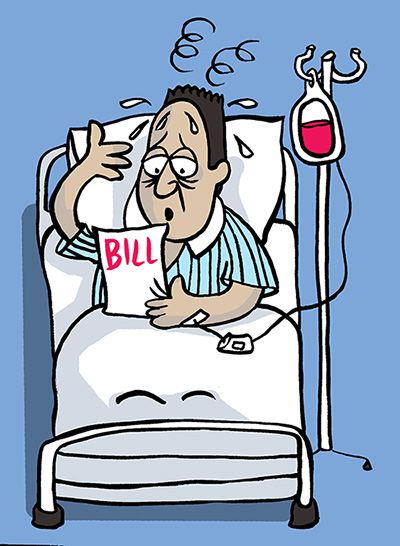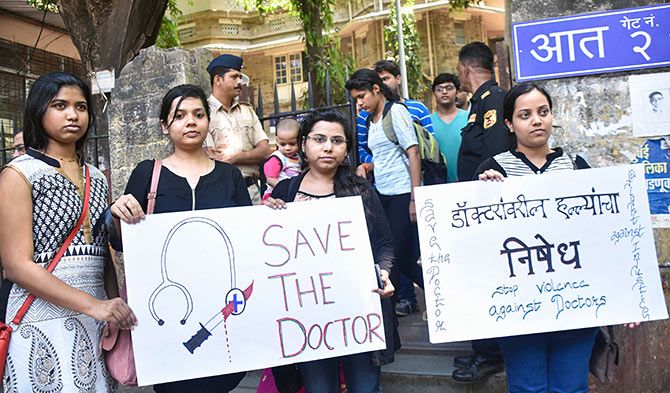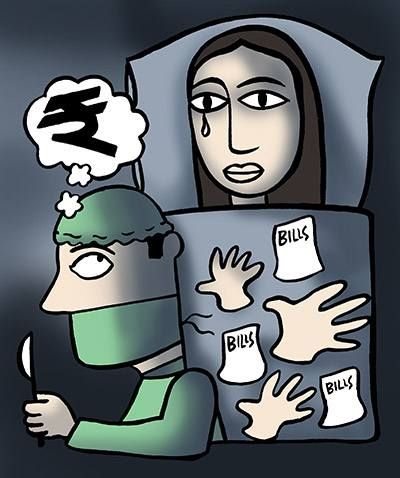They say new rules that make over-billing by private hospitals a criminal offence will hurt their ability to treat patients properly, says Subir Roy.
Illustrations: Uttam Ghosh/Rediff.com.

Private hospitals and nursing homes in West Bengal have been in the news for all the wrong reasons.
Last month, a 16-year-old girl died at a Kolkata hospital after she was admitted with stomach pain. Her relatives alleged medical negligence and a local mob damaged the hospital and beat up at least one doctor.
Also in the news were three nursing homes in north Bengal being investigated for running a child racket.
A week after the vandalism, Chief Minister Mamata Banerjee held a meeting at the Kolkata Town Hall with the bigwigs of several leading private hospitals and gave them a dressing down, pulling up individuals and naming names.
She also announced the setting up of a regulatory commission to monitor private healthcare setups and the tabling of a bill in the state assembly to enable it.
As luck would have it, barely two days later, a road accident victim died at a state hospital hours after he was shifted from Apollo Gleneagles, a private hospital, because his relatives had run out of money.
Most damagingly, Apollo discharged him only after his family gave a cheque and fixed deposit receipts as security.
Apollo’s attempt to deny that it had insisted on the fixed deposit receipts, and later attempts to return the money, did its position no good in the public eye.
A couple of days after the victim’s death, his family filed a first information report with the police against the hospital.
The government thereafter launched a six-member probe into the death and the family’s allegations. Banerjee, ever so outspoken, went on to compare private hospitals with a ‘kasaikhana (slaughter house)’.
She thereafter personally piloted through the legislative assembly, in a marathon sitting, the bill which sought to make it criminal for hospitals to engage in over-billing, refuse to treat an accident victim and hold on to a dead body till the bills are cleared.
Hospitals will have to offer patients fixed rates for procedures covering the entire gamut of treatment with scope for the final bill exceeding the initial estimate by only a percentage.
The West Bengal Health Regulatory Commission, up under the law, is a quasi-judicial body which will adjudicate disputes and examine complaints.
Banerjee, an astute politician, has tapped on to the widespread feeling that the private healthcare system is highly unethical and instances of indifference bordering on callousness have shown up even at top hospitals.
A mixed response

The response of doctors in West Bengal to the Bill has been complicated by the fact that there is a split among them. The state unit of the Indian Medical Association, which has close ties with the ruling Trinamool Congress, does not wish to oppose the new rules.
The split became open when a section of doctors met in Kolkata and decided to move legally against the new rules and be in touch with the national office bearers of IMA.
The unstated worry of the entire private healthcare sector is that the West Bengal law will give ideas to other states.
Jharkhand reportedly has a similar draft bill ready.
The state unit of IMA says it is supporting the law as it seeks to ‘stop extortion in the name of treatment’.
On the other hand, the doctors opposing the new rules put forward several arguments.
One, it will add one more entity to the several layers of supervisors, including the Medical Council of India (it has in the past been considered ineffective in moving against culpable doctors because it is described as doctors deciding on the actions of doctors).
Perhaps most critically, the new law puts every clinical action of doctors under scrutiny, making it difficult for them to function under such conditions.
Particularly pointed is one doctor’s comment: “The law has thrown open the floodgates and seems to have given everyone a licence to have a go at doctors. We are being abused and threatened without any fault.”
Even while supporting the purpose of the law, the state secretary of the IMA has said that there have been reports of people refusing to pay even “legitimate medical bills and assaulting doctors.”
In the absence of the state unit of IMA taking any action, K K Aggarwal, president of the Indian Medical Association, had written to Governor Keshari Nath Tripathi seeking a debate on the bill (before it became law), which he says is unfair to doctors and leaves out government hospitals from its ambit.
He has also pointed out that doctors have been made liable under criminal laws when there are no provisions against medical establishments. “It is more often the hospitals that are responsible for the lapses.”
He also feels that fixed packages will restrict treatment and affect doctors’ judgement.
This is somewhat strange as health insurance companies enter into agreements with hospitals and nursing homes which lay down the rates for standard procedures. These rates are the benchmarks for third party administrators to approve claims.
Besides, these rates are not uniform. They vary according to the category to which a hospital belongs.
The Central Government Health Scheme similarly lays down protocols of rates at which an approved private hospital can perform procedures for those covered under the scheme.
The more upmarket hospitals decline CGHS business as those rates are too low for them.
Even before the new law to regulate private hospitals has come into play, the whole controversy has had a positive effect.
The West Bengal government’s plan budget for the health ministry for the current year has been raised 10 per cent to improve the infrastructure for the state’s public healthcare system.
Experts say that the quality of private healthcare is critically dependent on the quality of public healthcare available. If government hospitals run better, then private hospitals will perforce have to run faster to remain a few steps ahead.
Strained ties

Relations between private healthcare providers and patients in the state are getting extremely strained with new developments.
Last week, after receiving a complaint of negligence from the relative of a patient who died of cardiac arrest within a couple of hours of being admitted into a nursing home in Hoogly, the police have booked the nursing home for 'culpable homicide’.
The patient’s relatives have alleged that they were not informed that the attending doctor was not capable of treating cardiac complications and the nursing home did not have the infrastructure to treat cardiac emergencies.
In the present atmosphere, there is every chance of the police becoming overzealous.
On the other hand, there is no denying that smaller establishments often admit patients and put them in critical care units with high price tags even though they know that they are not capable of treating that particular type of complication.
It is doubtful if, given the current administrative culture (the commission will reflect it) and the attitudes of private healthcare providers and patients and their relatives, the new law will result in better delivery of private healthcare.
All that can be hoped for is that it will temporarily put private hospitals on their toes, thus reducing the extent of over-billing and negligence.
The regulatory commission’s long term success will depend on how it conducts itself. Experts say it should act fast and only take up for scrutiny complaints which appear prima facie serious.
Also, through its first few awards, it should reassure doctors that they can do their job without constantly having to look behind their backs and make private hospitals aware of the high risks of over billing.











